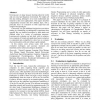Free Online Productivity Tools
i2Speak
i2Symbol
i2OCR
iTex2Img
iWeb2Print
iWeb2Shot
i2Type
iPdf2Split
iPdf2Merge
i2Bopomofo
i2Arabic
i2Style
i2Image
i2PDF
iLatex2Rtf
Sci2ools
137
click to vote
AUSDM
2008
Springer
2008
Springer
Minors as Miners - Modelling and Evaluating Ontological and Linguistic Learning
Growing up is in large measure learning about the world and our social and linguistic environment. We might call this data mining, although it is far more multimodal and immersive than most applications. This paper describes computational research into how children learn, with a particular focus on evaluation in both supervised and unsupervised paradigms. Conversely, we gain additional insight into association mining by considering psycholinguistic experiments that quantify the way human association by both adults and children relate to a variety of association measures. Learning and evaluation are not dealt with in isolation, but a program of formal and application-based evaluation is expounded and exemplified to show how to evaluate discovered patterns with and without a gold standard. In this context, some serious issues with current evaluation techniques and accuracy measures are identified and the unbiased techniques identified.
Application-based Evaluation | AUSDM 2008 | Current Evaluation Techniques | Data Mining | Evaluation |
Related Content
| Added | 12 Oct 2010 |
| Updated | 12 Oct 2010 |
| Type | Conference |
| Year | 2008 |
| Where | AUSDM |
| Authors | David M. W. Powers |
Comments (0)

